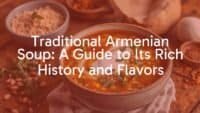An Armenian breakfast is much more than just food; it’s a welcoming meal based on tradition, fresh ingredients, and family ties. While some people may be used to a quick breakfast alone, Armenian breakfasts are often enjoyed over a longer time with loved ones. The meal is about turning simple foods into a generous and satisfying spread, especially on weekends or special mornings.
Armenian breakfast is about comfort, nutrition, and sharing. It’s a way to start your day prepared-whether you’re going to work or spending time with family. The main focus is on fresh vegetables, dairy, and unique breads, which together make for a flavorful and hearty meal.

Key Elements of Armenian Breakfast Foods
An Armenian breakfast usually includes eggs, fresh vegetables, a variety of cheeses, and important Armenian breads. Imagine a table full of colorful tomatoes, soft cheeses, and fresh herbs next to perfectly cooked eggs. Everything is meant to appeal to your senses and fill you up for the day.
Fruits are also common-both fresh and as jams such as green walnut jam, apricots (Prunus armeniaca), cherries, and especially mulberries. These sweet touches balance the savory dishes. Of course, coffee is always served to give a morning boost.
Traditional Ingredients in Armenian Morning Meals
Armenian breakfasts are built around fresh and high-quality ingredients. Eggs are a key player, sometimes scrambled with tomatoes, put into omelets, or even topped with sugar in a traditional style from Dikranagertsi families. Cheeses-mostly Armenian types-are also essential, bringing salty or creamy flavors that pair well with other dishes.
The fresh vegetables, especially tomatoes, are highly valued for making their own tasty sauce for eggs. Herbs add fresh flavor, and breads (from simple loaves to sweet pastries like Choereg) help you enjoy every bite.
Types of Armenian Breakfast Recipes
There’s a lot of variety in Armenian breakfast food, from filling, savory items to sweet treats. This mix comes from Armenia’s food traditions, and morning meals are seen as very important. Whether you want something heavy or light, you’ll find a recipe to enjoy.
Popular Hot Armenian Breakfast Dishes
Some favorite hot dishes include eggs (sometimes mixed with meat). Scrambled eggs with tomato is a popular choice: cut up fresh tomatoes, cook with eggs, add salt and pepper, and enjoy with bread. The tomatoes work like a natural sauce. You might also find versions with cured beef (basterma), garlic, or herbs for extra taste.

There are also dishes featuring lamb and eggs, making for a heavier breakfast, especially on chilly days or before a busy schedule. Lamb paired with eggs gives a filling and flavorful meal.
Classic Armenian Egg-Based Recipes
Egg dishes are a mainstay of breakfast. Besides scrambled eggs with tomato, there are different omelets, including the “plain omelet,” which is cooked flat and sometimes sprinkled with sugar (a custom especially in Dikranagertsi families).
Another special dish is the Roasted Eggplant and Lamb Omelet. Roasted eggplant, lamb, and eggs are cooked together, showing how Armenians combine simple foods into something flavorful and meaningful.
Armenian Breakfast Breads and Pastries
Breads and pastries are a big part of Armenian breakfasts. Choereg (or Choreg) is a sweet, braided bread often topped with sesame seeds. It’s soft and slightly sweet-ideal for sharing.

Bishi (also called Zeppole) is a light, fried doughnut that can be topped with powdered sugar or syrup. The dough can be made in advance for easy frying the next morning. Keta, another option, is a walnut-filled pastry, offering a sweeter, richer choice for breakfast.
Vegetarian and Vegan Armenian Breakfast Options
Many Armenian breakfasts are naturally vegetarian or easy to make vegan because they focus on fruits, vegetables, and grains. Scrambled eggs with tomatoes is vegetarian by default. A meal of fresh fruit, cheeses, vegetables, and bread can be substantial without meat or dairy.
For vegan diets, skip the cheeses and eggs, and build a breakfast around tomatoes, cucumbers, olives, herbs, and bread. Fruit and vegetable dishes are filling, tasty, and nutritious, fitting different eating styles.
What Ingredients Define Armenian Breakfast Recipes?
Armenian breakfasts stand out because of their fresh, colorful, and often aromatic ingredients. These foods come together to make meals that are both comforting and flavorful.
Common Herbs and Spices in Armenian Breakfasts
Herbs and spices add gentle flavor to Armenian breakfast. Parsley, dill, and cilantro are often included with eggs or cheese. They add freshness and balance richer foods.
Spices are used in moderation-mostly salt and pepper. Sometimes, dishes might include garlic powder or chipotle powder for a modern flavor, and the spice mahleb (from cherry pits) is found in some breads like Choereg, giving a faint almond or cherry scent.

Dairy, Cheeses, and Yogurt in Armenian Morning Fare
Dairy is a staple at Armenian breakfast tables. Cheeses are usually served plain with bread and vegetables, offering different textures and flavors. Yogurt is thick and tangy and can be eaten alone, often with honey or nuts, or alongside savory plates. Freshness is important for a real taste.
Role of Fresh Produce and Grains
Vegetables are key-especially tomatoes, which lend juicy flavor and color. Other common additions are cucumbers and peppers, bringing crispness and nutrition.
Bread, made from grains, is central. It might be a plain loaf or something sweet and rich like Choereg. Bread is often used to scoop up eggs, cheese, and veggies, making sure nothing is wasted. Together, produce and bread provide energy and fiber to start the day right.
Step-by-Step Guide to Preparing Favorite Armenian Breakfast Recipes
Making Armenian breakfast at home is straightforward. Many recipes are simple, relying on fresh, easy-to-find foods and basic methods. Here are preparation steps for some classic dishes:
Lamb and Eggs: Classic Preparation Methods
- Chop or grind lamb, then cook in a bit of oil until browned and aromatic.
- Crack eggs into the same pan. Either scramble them together or let the eggs cook on top of the lamb to your liking.
- Season with salt and pepper. Add herbs like parsley or cilantro at the end if desired.
- Serve hot with Armenian bread.

Roasted Eggplant and Lamb Omelet: Authentic Armenian Technique
- Slice eggplant, then roast or fry until soft and slightly browned for extra flavor.
- Cook ground or diced lamb separately, seasoned simply with salt, pepper, and maybe a little cumin.
- Mix roasted eggplant and cooked lamb together in a pan.
- Beat eggs with salt and pepper. Pour over the lamb and eggplant mixture. Cook gently until eggs are set.
- Serve as a filling breakfast dish rich in vegetables and protein.
Matnakash and Other Traditional Breads at Home
- For Choereg, mix yeast with warm water and sugar. Let it activate and bubble.
- Beat eggs with melted butter and more sugar, then add warm milk. Mix with the yeast.
- Combine with flour, baking powder, salt, and mahleb (or flavor substitutes like almond and cherry liqueur).
- Knead the dough until smooth, then let rise until doubled in size.
- Shape into loaves (often braided for Choereg), let them rise again.
- Brush with egg, top with sesame seeds, then bake until golden.
Nutrition and Benefits of Traditional Armenian Breakfast Foods
Armenian breakfasts are not only flavorful-they’re good for you. Simple, whole foods provide all the nutrients you need to start your day.
How Armenian Breakfasts Support a Balanced Diet
- Eggs bring protein for energy and fullness.
- Vegetables like tomatoes and cucumbers supply vitamins and antioxidants.
- Bread and grains provide fiber and help digestion.
- Cheese and yogurt offer calcium and probiotics.

Eating breakfast in a a relaxed, social setting can also improve your mood and helps you enjoy your meal, supporting mental well-being.
Questions and Tips about Armenian Breakfast Recipes
Trying Armenian breakfast foods at home may bring up some questions. Here are some common tips and answers for cooking and ingredient swaps:
What Are Common Substitutions in Armenian Breakfast Cooking?
| Original Ingredient | Possible Substitute |
|---|---|
| Armenian cheese | Feta or mild white cheese |
| Basterma (cured beef) | Ham or spicy sausage |
| Mahleb (cherry seed spice) | Almond extract + cherry liqueur |
| Seasonal produce | Bell peppers, spinach, or local vegetables |
How to Adapt Recipes for Dietary Restrictions?
- Gluten-free: Serve egg and veggie dishes with gluten-free bread or rice cakes.
- Dairy-free/Vegan: Use fruits, vegetables, olives, and plant-based yogurts/cheeses. Scramble silken tofu with veggies instead of eggs as a vegan option.
Frequently Asked Questions about Armenian Breakfasts
- Are Armenian breakfasts sweet or savory? Mostly savory, but jams and sweet touches (like sugar on omelets) are part of the tradition.
- Are there regional variations? Yes-some areas (like Dikranagertsi families) add sugar to eggs or prefer certain breads.
- Are Armenian ingredients hard to find? Many are common in most grocery stores, but specialty cheeses or spices can be ordered online or found at international markets.
- Best way to enjoy Armenian breakfast? Slowly, with others, and alongside coffee-make it a meal to share, not to hurry.
Where to Find More Armenian Breakfast Recipe Inspiration
If you want more ideas, there are many resources-both books and online-for learning about Armenian breakfasts.
Recommended Cookbooks and Food Blogs
- Cookbooks: Search for books by Armenian authors or chefs for real, family-style recipes.
- Food Blogs: Sites like “The Armenian Kitchen” offer step-by-step recipes and tips, as well as stories and advice in the comments section.
Popular Armenian Breakfast Dishes to Try Next
- Choereg (brioche-style bread): A tasty baking challenge that fills your house with a pleasant smell.
- Try different Armenian cheeses with fresh herbs and olives for a simple yet special breakfast.
- Bishi (Armenian Zeppole): Light, fluffy doughnuts that are great with sugar or syrup.
- Lamb and egg recipes: For days when you want something more filling.
- Jams: Make or buy green walnut, apricot, or mulberry jam for a true Armenian touch.
Armenian breakfast is all about variety, comfort, and bringing people together. Each time you try a new recipe, you learn a little more about Armenian food culture.
















Leave a comment